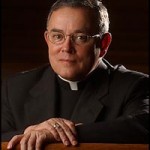Before I was a bishop and even before I became a priest, I was a Capuchin Franciscan. The Capuchins were a reform movement within the Franciscan community. They wanted to get back to the real St. Francis; the radical, simple St. Francis.
History calls Francis the vir Catolicus — the embodiment of everything a Catholic believer should be; a person filled with faith, joy, simplicity, courage, charity and zeal for Jesus Christ. Francis had all these qualities, and of course even non-Catholics remember him because of his love for life and nature, and his witness for peace.
But what many people overlook is that Francis lived in an age very much like our own. Francis was not just a loving man. He was also a formidable one, because he had to be. The 13th century was a time of deep political unrest; a time of great confusion and corruption in the Church.
Francis began his life submerged in that world. He was comfortable. He was selfish. He was shallow. But at his core, he was also hungry for something more in his life — and once he found it, he pursued it without compromise. What Franciscans remember about St. Francis is his demand that we live the Gospel sine glossa — without gloss, without excuses, without interpretations to make discipleship easier or more comfortable.
Francis was a revolutionary in the truest sense. He wanted a radical commitment to holiness from his brothers. He wanted to be different as Jesus was different. Francis wanted to live in the presence of God, as Jesus did, which required acting in ways that contrasted sharply with the ways of this world.
What distinguished Francis from all the other reformers of his day was one simple thing. He knew that he could never live out his love for God alone, or even with a group of friends. He needed the larger family of faith Jesus founded. He needed the Church. So he never allowed himself or his brothers to be bitter in their criticism, or to separate the Gospel from the Church, or the Church from Jesus Christ.
What Francis heard from Jesus on the Cross of San Damiano was not “replace my Church” or “reinvent my Church,” but “repair my Church.” And Francis did that in the only way that lasts — one stone at a time, with the living stones of his own life and the lives he changed through his personal witness.
If we want to be disciples and make disciples; if we want to repair the Lord’s Church in the wake of so many problems that have wounded Catholic life over the past decade; we need to understand that yes, new policies and programs and reforms in the Church are vital. We clearly need them. But without saints, nothing we do will work.
Without holy men and women on fire with Jesus Christ, in love with his Church, and zealous in preaching the Catholic faith through their words and actions, nothing will work. We can’t give what we don’t have. If Jesus Christ and a real Catholic identity don’t burn in the interior cathedral of our hearts, we can never possibly rebuild the external life of the Church in the world.
Next month, October 4, marks the feast day of Francis of Assisi. One week later, October 11, we begin the Year of Faith. In the weeks ahead, as families settle into another autumn of school and work, it’s a good time to ask God to turn all of our hearts to the work of renewing our local Church and her witness to the wider community. And we begin that work by renewing our own hearts first, through our faith in Jesus Christ.




Share this story